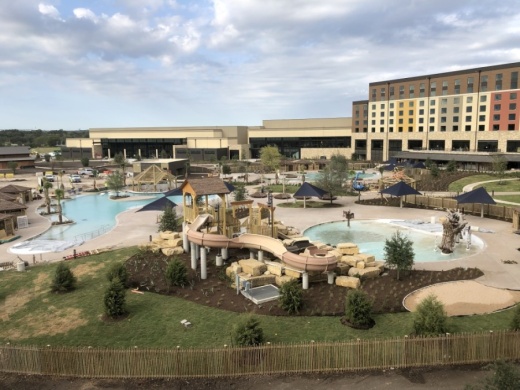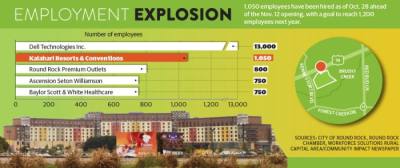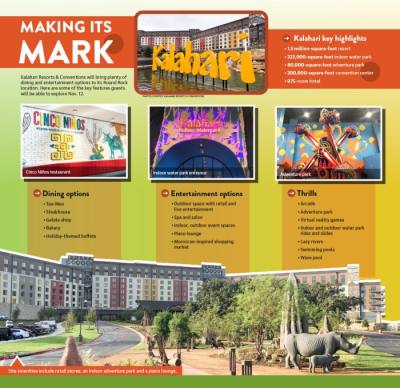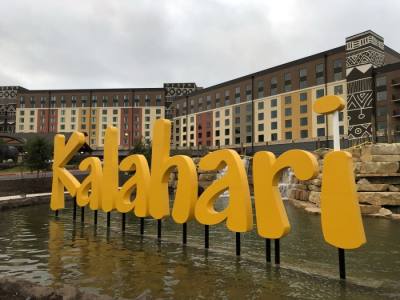Kalahari has hired about 1,050 employees, said Brian Hernandez of Workforce Solutions Rural Capital Area—an organization that helped run drive-thru and virtual job fairs for Kalahari this summer—in an email. By spring 2021, Kalahari Resort General Manager Tim Arnold said, the resort is expected to employ approximately 1,200 people across various industry concentrations, from culinary and housekeeping positions to information technology, maintenance and managerial roles.
“This was a unique time to be opening a facility like this in the tourism and hospitality industry,” Ball said. “I don’t think there’s any doubt that [Kalahari has] been able to swoop in and provide some opportunity for some families that otherwise would have been hurting right now.”
Arnold has spent more than 30 years working in the hospitality industry. Kalahari’s Nov. 12 grand opening in Round Rock will mark his 14th resort launch—an undertaking, he said, that has been one for the books.
“I’ve never experienced anything like it,” Arnold said. “There’s been moments of it that have been more rewarding than anything I’ve ever done, and there’s been moments that have been more difficult than ever before.”
Wave of growth
Kalahari’s Round Rock location has been in the works for more than four years, but Arnold said bringing the project to its culmination during the pandemic has posed unforeseen obstacles. However, because construction was classified as an essential industry during the pandemic, Arnold said the development was able to stay on track for its opening date and that social distance has been maintained among construction crews throughout the development site.
Similarly, despite unprecedented unemployment figures throughout the Greater Austin area, Arnold said Kalahari’s employment opportunities are serving as a rare novelty as the hospitality industry has borne the brunt of the pandemic.
“What we found is that because the economy shrank with the number of available jobs, we were able to pick up a lot of really great people and help them out,” Arnold said. “And they’re able to help us and keep us on course.”
Kalahari’s Round Rock resort is the company’s fourth in the nation and earned the title of the largest indoor water park in the country. As the company has navigated its transition down south and weathered the coronavirus outbreak, Arnold said Kalahari’s partnership with Round Rock is a testament to its ability to open on track with its original projections.
“Round Rock has just been an amazing city to do business in, even throughout this crisis,” Arnold said. “They have been supportive and they have been very open to communicate everything as it was happening.”
Enacting safety provisions
Kalahari features an indoor and outdoor water park and adventure space, a hotel, a convention center, and dining and retail destinations. All site amenities will be available for area residents to use Nov. 12, except for hotel pools, Arnold said. The hotel pools’ uses are limited to individuals with hotel reservations.
The largest balancing act during the pandemic, he said has been reimagining how to accommodate the resort’s offerings to social distancing and safety provisions while maintaining the spirit of the Kalahari experience. While Arnold said enforcing these measures for staff has been relatively easy, he credited the work of Kalahari’s employees in upholding these provisions for guests and ensuring they are followed.
The use of masks will be required of staff and visitors throughout the entire resort, Arnold said, except for when guests are dining, in their hotel rooms, swimming in pools or using water slides. Kalahari overhauled and revamped its cleaning and sanitation protocols in June to switch to hospital-grade disinfectants, Arnold said.
Despite the work of making additional sanitation provisions, Arnold said implementing social distancing measures have been more manageable than one might anticipate given the 1.5 million square feet available within the resort. Between higher occupancy allowances in Texas and an uptick in travelers, Arnold said the resort’s convention center—a 200,000-square-foot indoor space—will still be able to host weddings, company events and other celebrations through the use of more distanced layouts. A Thanksgiving Day buffet, set to be held in the convention center, is selling out at a pace far more rapid than anticipated, Arnold said.
Making its mark
Prior to the onset of the pandemic, the city of Round Rock anticipated earning approximately $4 million annually in revenue related to Kalahari, said Susan Morgan, the city’s chief financial officer.
Multifamily and commercial properties, such as Kalahari, contribute around 45% of the city’s property tax revenue stream, which eases some of the financial burden for homeowners, Morgan said. Property taxes, which are collected from businesses and homeowners, are used to cover general city operation costs, such as those for roads, police and city facilities, including libraries and parks.
Taking into account the financial implications of the pandemic, Morgan said the city is “conservatively” estimating it will not collect its projected $4 million in annual revenue until 2022 or 2023, depending on the length of the public health crisis.
“I’m not counting on any of that [revenue] in this first year because of what’s happened with the pandemic,” Morgan said. “But [Kalahari’s] other sites seem to be working well. Like anything else, we’ll just have to wait and see.”
In looking at the short term, Ball said the emergence of Kalahari as a top city employer is an exciting new asset that could help with efforts to establish Round Rock as a destination city. However, he said he would be remiss to not address the historical impact that companies like Dell have had on laying the groundwork for future economic growth.
“It’s a self-sustaining ecosystem,” Ball said. “Once it starts, it really starts to get its own momentum and inertia that just continues to build. And here we are, three decades down the road, and we’re still seeing the benefit from that.”









